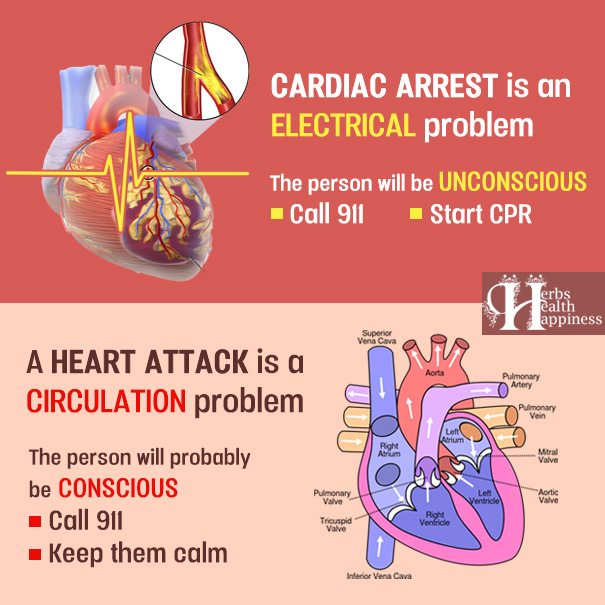
Infographic – herbshealthhappiness.com Photo sources – see foot of article
People often confuse cardiac arrest and heart attacks due to the similarities in the names and symptoms.
Both conditions cause millions of deaths every year, with an increasing incidence driven by the obesity epidemic. [1]
What Is Cardiac Arrest?
Cardiac arrest is an umbrella term used to describe an electrical dysfunction of the heart which halts the function of pumping blood.
There are several possible causes of cardiac arrest including heart attack, drug overdose, hypoxia, ventricular fibrillation, torsade de pointes (a dangerous type of arrhythmia) and electric shock.
Ventricular fibrillation is an electrical activity inside the heart that is so chaotic that the heart quivers or ‘fibrillates’ instead of pumping.
To rescue patients with cardiac arrest, doctors shock the heart with electrical pads in an attempt to reset the electrical current inside the muscle.
Cardiac arrest often happens without warning and leads to sudden collapse. The patient will typically be unconscious and unresponsive. Without immediate medical attention the person will die. Phone emergency services immediately and start CPR.
CPR helps blood and oxygen circulate to the brain and prevent brain damage. Many public places have defibrillators which are simple to use and have instructions. These deliver controlled electrical pulses which may help the heart to beat normally again.
Note on electric shock: In cases of electric shock, the first important step is to turn off the electrical supply and be sure that the patient is not still receiving electrical current. This is of course for the well being of the patient – but also, touching a person who is still receiving electric current could result in the second person being shocked! If the patient is in water and there is a likelihood that the water is still electrified, for example in case of a fallen power line, don’t touch the water or metal / conductive objects that are touching the water until it has been established that the electrical supply has been shut off! Any potentially dangerous electrical condition or fault should of course be reported to the emergency services.
What Is A Heart Attack?
A heart attack refers to the obstruction of blood supply to the heart muscle. The condition is also known as myocardial infarction, and it’s typically caused by a type of coronary artery disease. [2] A heart attack can lead to cardiac arrest.
During a heart attack, the coronary artery (i.e., the primary vessel that supplies the heart) gets clogged, which leads to the starvation and death of heart cells.
The patient will typically be conscious but may be in a state of panic. Keep them calm.
In either case, you should make an emergency call immediately and stay with the patient until help arrives.
References:
[1] Heart Disease and Stroke Statistics—2017 Update: A Report From the American Heart Association (2017). https://www.ahajournals.org/doi/10.1161/CIR.0000000000000485
[2] Ojha, N., & Dhamoon, A. S. (2019). Myocardial Infarction. In StatPearls [Internet]. StatPearls Publishing. https://www.ncbi.nlm.nih.gov/books/NBK537076/
Infographic Photo Sources:
https://en.wikipedia.org/wiki/File:Blausen_0463_HeartAttack.png
https://en.wikipedia.org/wiki/File:Diagram_of_the_human_heart_(cropped).svg
★ Get My Books - 100% FREE:
😳 Tinnitus And Brain Health?
After 47 years of studies and countless brain scans done on more than 2,400 tinnitus patients, scientists at the MIT Institute found that in a shocking 96% of cases, tinnitus was actually shrinking their brain cells.
As it turns out, tinnitus and brain health are strongly linked.
Even more interesting: The reason why top army officials are not deaf after decades of hearing machine guns, bombs going off and helicopter noises…
Is because they are using something called "the wire method", a simple protocol inspired by a classified surgery on deaf people from the 1950s...
★ How To Get Rid Of Nail Fungus:
★ Does Your Salad Contain This Vegetable?
★ 20 Natural Painkillers In Your Kitchen (Video):
★ Men's Prostate Health:

2. Famous Chef Sheds 60lbs Researching New Paleo Recipes: Get The Cookbook FREE Here
3. #1 muscle that eliminates joint and back pain, anxiety and looking fat
4. 7 odd foods that KILL your abdominal fat (surprising fat-fighters)
5. The TRUTH about bread (Will surprise you!)
6. [PROOF] Reverse Diabetes with a "Pancreas Jumpstart"
7. Here's What Happens When You "Unlock Your Hip Flexors"
8. The #1 WORST food that CAUSES Faster Aging (beware -- Are you eating this?)
The #1 Muscle That Eliminates Joint And Back Pain, Anxiety And Looking Fat
By Mike Westerdal CPT
Can you guess which muscle in your body is the #1 muscle that eliminates joint and back pain, anxiety and looking fat?
This is especially important if you spend a significant amount of time sitting every day (I do, and this really affects me in a big way!)
Working this "hidden survival muscle" that most people are simply not training because no-one ever taught them how will boost your body shape, energy levels, immune system, sexual function, strength and athletic performance when unlocked.
If this "hidden" most powerful primal muscle is healthy, we are healthy.
Is it...
a) Abs
b) Chest
c) Glutes
d) Hip Flexors
Take the quiz above and see if you got the correct answer!
P.S. Make sure you check out this page to get to know the 10 simple moves that will bring vitality back into your life:
If you enjoyed this page:












